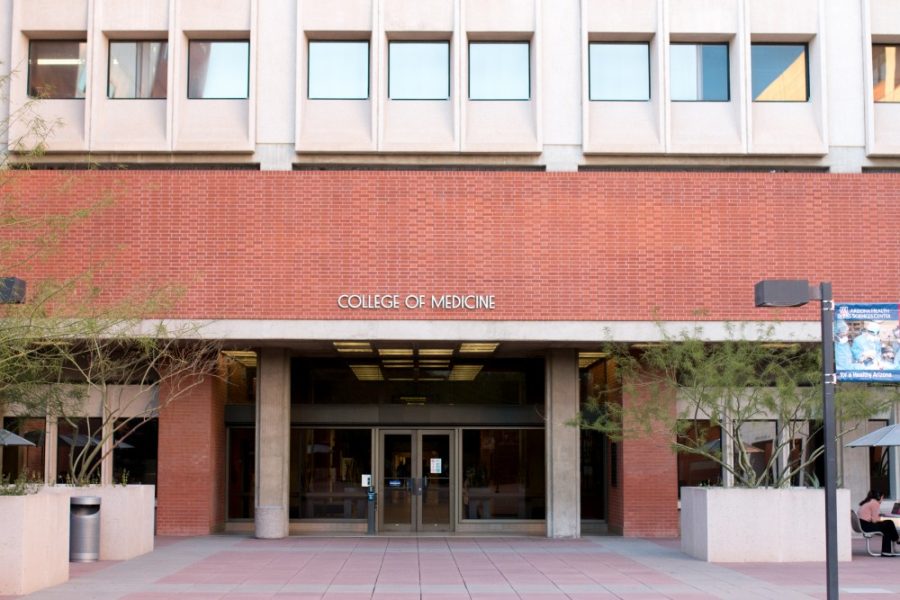At least three times a week, somewhere along the roads of Tucson, there is a vehicle outfitted with two complete medical examination rooms and a phlebotomy lab driving around, preparing to deliver healthcare to people across Southern Arizona.
This is the Mobile Health Program, an organization run by the UA College of Medicine that has operated for nearly 40 years. It is a mobile clinic that brings health services to people throughout the area who cannot afford health care at other clinics or who do not have regular access to health services.
According to Patrick Rivers, program coordinator for the Mobile Health Program, the program was started in 1976 by Dr. Augusto Ortiz and his wife.
At the program’s start, Ortiz provided health services out of a van, but over the years, the program has grown both in medical equipment and in the amount of people served. Rivers said that the program now serves around 2,500 people per year across Southern Arizona.
The majority of people the clinic serves are in low-income and “medically underserved” areas, according to Rivers. These areas provide little access to medical facilities, and sometimes people cannot afford the health care available there. In these cases, the clinic is there to help.
“No individual is turned away from our services, regardless of their ability to pay,” Rivers said. “We ask for a small donation, but if they are individuals who are unable to pay anything, then we’ll still see them.”
The clinic provides different services ranging from primary care to prenatal care, according to Elizabeth Knight, a nurse practitioner and the lead primary care provider of the Mobile Health Program. These services can include immunizations, dental screenings, fluoride varnishings and diabetes education.
The dental screenings and fluoride varnishings become particularly common services the few times a year that the Mobile Health Program visits elementary and head-start schools.
Two schools in particular -— Summit View Elementary School and the elementary-and-middle-school-turned community resource center Los Ranchitos — are sites of frequent visits from the clinic, according to Rivers.
Rivers said there are about six, spread-out sites around the Tucson area that the clinic regularly visits, with about three clinics held per week and about two other days spent visiting schools or health fairs.
“I think that [these regular sites] have become established partners as it’s been noticed that these sites served a particular need,” River said. “Or that they were strategically well-placed to see vulnerable populations and kind of spread out geographically, so that we are reaching places where there isn’t great access to regular care at a brick-and-mortar clinic.”
According to Dr. Myra Muramoto, the department chair for the UA Department Family and Community Medicine, the Mobile Health Program is supported by Banner-Health University Medical Center Tucson, the UA College of Medicine-Tucson and its Department of Family and Community Medicine, among other organizations in the community.
This support has helped the program grow and has enabled it to provide services to more patients, as well as helping the program in a different way: providing education and volunteer opportunities to residents at the university’s hospital, medical students and undergraduate students.
Rivers said nearly every clinic day, one medical student and one undergraduate student will assist the program, often completing administrative tasks, acting as a translator for Spanish-speaking patients or taking patients’ vitals. Medical students often work with the clinic through the Commitment to Underserved Peoples program.
According to Dr. Susan Hadley, the medical director for the Mobile Health Program, medical residents specializing in obstetrics and gynecology are frequently trained in the mobile clinic because OB-GYN packages are “very inexpensive” at the clinic, making them one of its staple services.
However, medical residents of a variety of specialties are also trained in the mobile clinic, so they can gain experience working in the community.
“Our family medicine residency program is training residents to go work in rural or underserved areas, so this gives them hands-on experience to go work in underserved areas of Tucson,” Hadley said.
This focus on serving the community is part of the Mobile Health Program that Knight appreciates.
“It’s very rewarding. It’s really community-based care,” Knight said. “A lot of times in a specialty setting, it’s much more focused on illness and this way, we’re really focused on wellness and helping the community.”
Follow Ava Garcia on Twitter.









